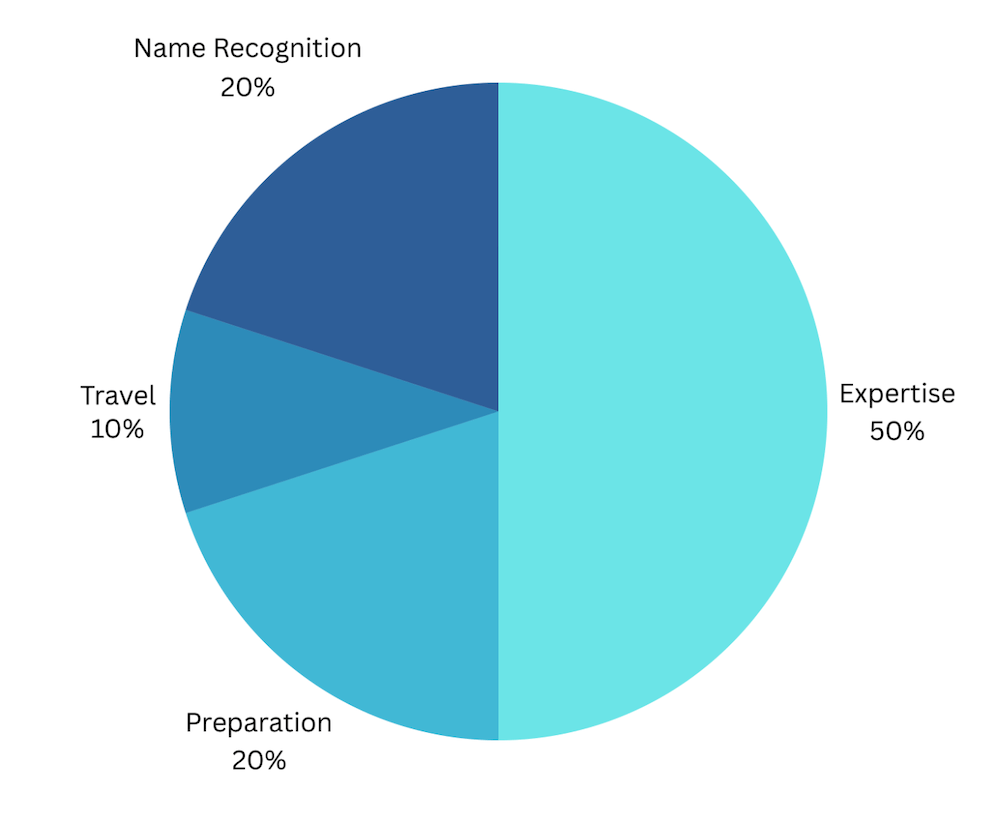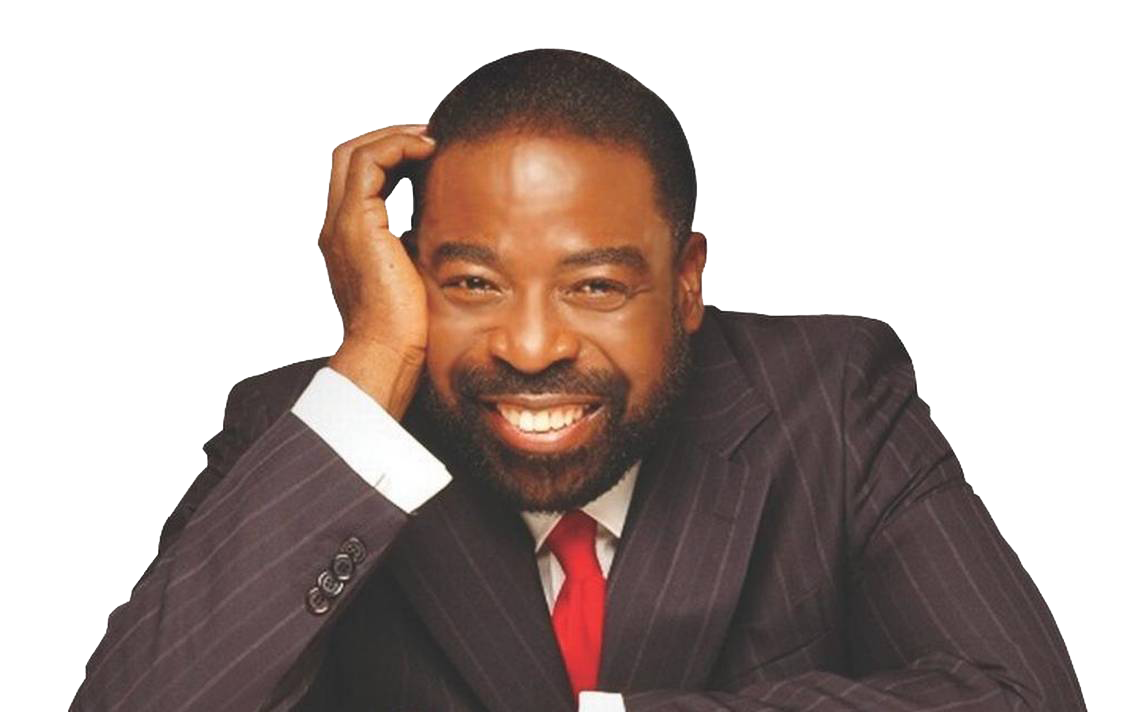If you are looking to book a speaker, you might be wondering: “How much does a speaker cost?”
The quick answer is that on average, professional speakers can range from $5000 to $100,000 depending on the speaker you are looking to hire.
Most professional speakers that are “easy to work with” are in the $10,000 to $50,000 range.
In this article, you will learn:
- The costs and fees associated with a speaker
- The factors that effect the speakers price point
- Why some speakers cost so much
- What you can expect from each price range
- How to save money on the speakers fee
- How a speakers bureau can help you
- How to choose the right speaker that fits your budget
Understanding Costs & Fees

When booking a professional speaker for your event, it’s essential to understand the various factors that influence their fees.
By considering these factors, you can make an informed decision and select a speaker that aligns with your budget and event goals.
Here are the main factors to consider:
1. Level of experience in their field
Speakers with extensive experience in their field, such as those who have been working for 30 years or more, will typically charge higher fees than those with less experience, such as someone who has been in their line of work for 10 years. This is because experienced speakers bring a wealth of knowledge, insights, and credibility to your event.
2. Speaking experience
Speakers who have been on the speaking circuit for a long time and have honed their presentation skills will often command higher fees than those who are just starting out. Experienced speakers have a proven track record of delivering engaging and impactful presentations, which justifies their higher rates.
3. Type of speaking engagement
Keynote speeches, which are typically the main highlight of an event, often command higher fees than guest speaker slots or panelist positions due to the expectation of a high-impact, inspiring, and longer presentation.
Discussion panels or fireside chats may require less preparation and be shorter in duration, resulting in lower fees.
4. Popularity and demand
Speakers who are in high demand and have limited availability will typically charge more than those who have fewer bookings or are not as busy. This is a simple matter of supply and demand – the more sought-after a speaker is, the higher their fees will be.
5. Brand name recognition
If you want to book a speaker with a well-known brand or a celebrity status, you can expect to pay a premium for their name recognition alone. These speakers often draw larger audiences and generate more buzz for your event, but this comes at a higher cost.
6. Audience size
The size of your audience can also impact a speaker’s fees. If you are hosting a large conference and selling tickets, a speaker may charge more than they would for a smaller seminar or workshop. This is because the preparation and delivery required for a larger audience is often more extensive and time-consuming.
7. Type of event or meeting
The structure and format of your event will also play a role in determining a speaker’s fees. For example, a keynote address at a major conference will typically command a higher fee than a breakout session or a panel discussion. Similarly, a full-day workshop will likely cost more than a 60-minute presentation.
8. Live or virtual event
On average, you can expect a speaker to charge 20 to 50% less for a virtual event. This is because it is much easier for the speaker to do a virtual event as they save a great deal of time on travel.
9. Travel expenses and other ancillary costs
Unless your event is being held in a major market like New York City, Chicago, or Los Angeles, you will likely need to cover the speaker’s travel expenses, such as airfare, lodging, and ground transportation.
Additionally, if you are booking a well-known “big name” speaker, they may have specific requirements on their rider, such as first-class travel, a certain type of hotel room, or specific audio-visual equipment. These additional costs can add up quickly and should be factored into your overall budget.
10. Length of presentation
The duration of the speaker’s presentation can impact their fees. A longer presentation, such as a half-day or full-day workshop, will typically cost more than a shorter keynote speech or breakout session.
This is because longer presentations require more preparation, content creation, and time commitment from the speaker.
On average, speaking fees are per hour, but you can negotiate with the speaker if you require additional time and adjust the fee accordingly.
11. Customization and research
If you request that the speaker customize their presentation to your specific industry, audience, or event theme, they may charge a higher fee. This is because customization requires additional research, preparation, and tailoring of the content to ensure it resonates with your audience and meets your event objectives.
12. Exclusivity
Some speakers may charge a premium for exclusivity, meaning they will not speak at other events in your industry or geographic area within a certain timeframe. This can be particularly important if you want to position your event as unique or exclusive.
13. Recording rights
If you plan to record the speaker’s presentation for future use, such as selling access to the recording or using it for marketing purposes, the speaker may charge an additional fee for the recording rights. This is to compensate for the potential impact on their intellectual property and the ongoing use of their content.
14. Speaker support materials
Some speakers may provide additional support materials, such as handouts, worksheets, or digital resources, to accompany their presentation. These materials can enhance the learning experience for your audience, but they may also come at an additional cost.
15. Payment terms
The speaker’s payment terms can also impact their fees. For example, some speakers may require a higher deposit or full payment upfront, while others may offer more flexible payment terms. It’s important to clarify these terms in advance to avoid any surprises or misunderstandings.
16. Cancellation policy
Most speakers will have a cancellation policy that outlines the terms and fees associated with canceling or rescheduling their appearance. It’s crucial to review and understand this policy before booking a speaker, as it can impact your budget and planning.
Price Range

If you are wondering how much does a speaker charge, here is a list of speaker fees:
Free to $4000
These are novice speakers who are starting out and do not have a lot of experience. They may be building their speaking skills and portfolio, and are often willing to speak for free or for a lower fee to gain exposure and experience.
Depending on what you are looking for, you might be able to find a local speaker in this range who can satisfy your needs, but keep in mind that their lack of experience may be reflected in their presentation quality and impact.
As the saying goes, “You get what you pay for”.
$5000 to $9000
The speakers in this range are the starting point for someone who considers themselves a “professional speaker“. They generally have a decent amount of experience and have demonstrated some level of expertise in their craft to charge this amount.
However, these speakers are less well-known and have not really established themselves as thought leaders in their industry.
It is important to note that most speaker agencies do not work with speakers who charge less than $5000 because those speakers are often not considered sufficiently qualified or experienced, and the bureau cannot endorse them.
In fact, most bureaus rates start at $10,000 because they just don’t want to take the risk of working with speakers who have not “graduated” to this level.
$10,000 to $20,000
This is the range where most “proven” professional speakers start.
These are the experts who not only have demonstrated a great deal of experience in their craft but have also honed their speaking skills, ensuring that when they deliver a presentation, they will definitely make an impact on your audience.
If you truly want to gain access to a wider range of high-quality speakers, it is highly recommended that you set a budget of a minimum of $10,000, as it will give you access to what is considered the industry standard of “professional speaker”.
$25,000 to $45,000
This is the price range where you start to gain access to a higher caliber of speaker.
These professionals have established themselves as thought leaders and authorities in their field and are much more in demand.
This is also the starting range for a “celebrity speaker” or someone with some brand name recognition, who can bring a level of prestige and excitement to your event.
$50,000 to $70,000
In this price range, you are now gaining access to the top-tier speakers in an industry who are very well-known.
They are the established thought leaders in their field and are highly sought after for their expertise and speaking abilities.
These are the people you hire if you want to have a “wow factor” at your event, where your attendees will be excited and impressed by the caliber of the speaker.
$75,000 and beyond
This is the price range where you are gaining access to big-name celebrity speakers in the industry.
All of the speakers that charge above $75K are the most recognizable names in their field, and their presence at your event can generate significant buzz and interest.
These speakers are often booked far in advance and have very limited availability, so it’s important to plan ahead and be prepared to invest in their fees if you want to secure them for your event.
Booking high-profile speakers in the $75,000 and above price range is not for the faint of heart. It requires a significant investment of time, resources, and effort, as well as a demonstrated level of professionalism and credibility. We will explain more below.
Why do speakers cost so much?
If you have never booked a speaker before, you might be shocked at how much they charge for a one-hour presentation.
It’s common for clients to question why speakers charge so much for what seems like a short amount of time on stage.
However, once you understand the factors that need to be taken into consideration, the speaker’s perspective becomes more understandable.
Here are the four main reasons why speaker fees can be so costly:

1. Expertise
When you hire an expert to speak at your event or company meeting, you are asking them to synthesize and distill their years of experience for your audience.
Many of these speakers have up to 40 years of experience in their field, and you are essentially paying for access to that knowledge and insight.
The fee reflects the value of their expertise and the impact it can have on your audience or organization.
2. Travel
If a speaker has to travel to your event or meeting, they are likely to lose at least two days of their life doing so.
From the speaker’s perspective, this is a significant cost, as they are losing time that they could be spending on other projects or engagements.
The fee helps to compensate for this lost time and the inconvenience of travel.
3. Preparation
While the presentation itself may only last 60 to 90 minutes, the amount of time that goes into preparing for it is often much longer.
On average, it takes a speaker one hour of preparation for every one minute of their speech.
This means that a 60-minute presentation can require up to 60 hours of preparation time, not including any customization that may be needed to tailor the content to your specific audience or event.
4. Name Recognition
If the speaker has a recognizable name or is considered a thought leader in their industry, you can expect to pay a premium for this level of credibility and brand recognition.
This is because a well-known speaker can help to attract attendees, generate buzz, and lend prestige to your event.
It’s important to keep in mind that the speaker’s fee is not just for the time they spend on stage, but for the cumulative value they bring to your event.
This includes their expertise, the time they invest in preparation and travel, and the impact that their name and reputation can have on your audience and your event as a whole.
How to book expensive speakers

When it comes to booking speakers in the $75,000 and above price range, it’s important to understand that the process can be quite challenging.
These high-profile, in-demand speakers are often booked months, if not years, in advance, and their schedules are tightly managed.
Many event planners and organizations reach out to us with the hope of securing them for their event, only to be disappointed when they discover that the speaker is unavailable or unwilling to commit.
The first thing you need to understand about these speakers is that they generally only accept a handful of speaking engagements per year.
Second, to successfully book a speaker in this price range, it is crucial to demonstrate a high level of professionalism, trust, and credibility.
These speakers are very protective of their brand and reputation, and they will only associate themselves with organizations that they believe are reputable and capable of hosting a high-quality event.
This means that you need to be well-prepared when approaching these speakers, with a clear vision for your event, a solid budget, and a track record of successful events in the past.
Be Patient & Flexible
In addition to establishing your credibility, booking these high-profile speakers requires a great deal of coordination and flexibility. You may need to work around their existing commitments, travel schedules, and other logistical considerations. This can involve multiple rounds of negotiation, as well as close collaboration with the speaker’s management team or booking agency.
It’s also worth noting that even if you are able to secure a high-profile speaker, there may be additional costs and requirements associated with their appearance. These can include first-class travel arrangements, luxury accommodations, and extensive audio-visual setups.
As an event planner, it’s important to factor these costs into your overall budget and to be prepared to meet the speaker’s requirements in order to ensure a successful event.
How to save money on speaker fees

If you’re looking to save money on speaker fees, there are two main strategies you can consider:
1. Opt for a virtual presentation
One of the most significant costs associated with booking a speaker is travel. Not only does it eat up a lot of the speaker’s time, but it can also be a major headache in terms of logistics and expenses.
By opting for a virtual presentation instead of an in-person one, you can easily save between 10% to 30% of the speaker’s fee. Many speakers are now well-equipped to deliver engaging and impactful virtual presentations, and this option can be a great way to reduce costs without sacrificing quality.
2. Provide a backend revenue stream
Another way to potentially reduce the upfront speaker fee is to offer the speaker the opportunity to generate additional revenue through your event or organization. For example, you could allow the speaker to sell their books, courses, or other services to your audience.
If the speaker sees the potential for significant backend revenue, they may be willing to charge less for their initial speaking fee.
However, it’s important to note that this approach may not work for all speakers, particularly those who are in high demand or have a strong brand name. These speakers may not be as motivated by the potential for additional revenue and may prefer to stick to their standard fee structure.
Be mindful
When considering these options, it’s important to weigh the potential cost savings against your overall event goals and priorities. While a virtual presentation can be a great way to save money, there may be certain situations where an in-person appearance is more impactful or appropriate.
Similarly, while offering a backend revenue stream can be appealing to some speakers, it may not align with your event strategy or audience expectations.
Ultimately, the key to saving money on speaker fees is to be flexible, creative, and willing to negotiate. This is also why it is highly beneficial to work with a speakers bureau who can help guide you.
Why are fees sometimes listed differently?

Speaker fees can be a source of confusion for many event planners, as they often fluctuate and vary depending on a number of factors.
It’s not uncommon to see different prices listed on different websites or to hear that another organization paid a different fee for the same speaker. This can make it challenging to accurately budget for your event and to know what to expect in terms of costs.
Availability
One of the main reasons for these fluctuations is that speaker fees are often based on the speaker’s availability and demand at any given time. If a speaker is in high demand and has a busy schedule, they may command a higher fee than if they have more open availability.
Also, if a speaker has a last-minute cancellation or a gap in their schedule, they may be willing to accept a lower fee for a booking that fills that slot.
Requirements
Another factor that can influence speaker fees is the specific nature of the event and the requirements of the engagement. A speaker may charge a different fee for a keynote address than they would for a workshop or a multi-day training session.
They may also charge more for an event that requires significant customization or preparation, or for an engagement that involves a particularly large or high-profile audience.
Given these variables, it’s not surprising that most websites and booking agencies don’t list exact speaker fees. Instead, they often provide a ballpark range or a starting point for negotiations. These figures can give you a general sense of what to expect, but they should not be considered final or binding.
Get A Price Quote
To get an accurate quote for a specific speaker and event, you will need to go through the negotiation process. This typically involves contacting the speaker or their representative directly, either through their website or through a booking agency. You’ll need to provide details about your event, including the date, location, audience size and composition, and any specific requirements or requests you may have.
Based on this information, the speaker or their representative will provide you with a more detailed quote and a sense of their availability and interest in the engagement. From there, you can negotiate terms, discuss any additional costs or requirements, and work towards a final agreement.
While this process can take some time and effort, it’s the only way to truly know the price of a speaker and to ensure that you’re getting the best value for your event. By being transparent about your budget and your needs, and by being open to negotiation and compromise, you can often find a speaker and a fee structure that works for your organization and your audience.
Find A Speaker
Need help finding the right speaker?
Let one of our agents guide you in this process so it can save you a lot of time and headaches.















